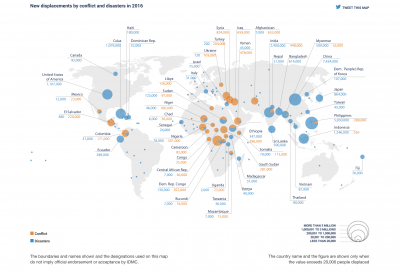The issue of internal and external migration of people is something I am very passionate about, and I think it is fascinating the amount of factors that provoke the migration of people whether the factors be environmental, violence, race, lack of resources, economics, etc. According to the 2017 Global Report on Internal Displacement, the global rate of internal displacement in 2016 was equivalent to one person forced to flee every second totaling to 31.1 million new internal displacements catalyzed by conflict, violence, and disasters in one years time.
In 2015 according the UNHCR there was a total of 40.8 million internally displaced peoples which means if we add the new figure of 2016 to that of the 2015 figure on internally displaced people the growth rate would be approximately 1.76 of internally displaced people globally and a rate of change from 2015 to 2016 of 31.1 million people displaced/year. Even though these figures are staggering, according to the IDMC, “Each year, IDMC provides robust, compelling evidence on internal displacement. Each year, the evidence fails to elicit a response commensurate with the scale of the problem. Why? Because of international indifference, lack of accountability, and state failure to protect.”



This is very interesting! I wrote about a similar topic and through my research found that environmental factors are impacting migration. As the threat of global warming intensifies, this will only increase. Your statistic that one person is forced to flee every second is very concerning and provides great insight into this huge problem.
This is an awesome way of highlighting the effects of various catastrophes and disasters that are unfolding worldwide. I find it of no surprise that the largest displacements have occurred in the Middle East due to the constant wars waged since 2001. I would also say that the issue of displacement has already become controversial in settling the debate of where to place refugees, but as these factors persist and continually drive people away from their homeland, more action will be required in helping solve the problem at it’s source.
This was really interesting, especially in light of the refugee crisis which has exploded in recent years. How to handle those fleeing their homes for any reason has been debated feverishly around the world. The idea that one person is forced to flee every second not only sets the scene for the depth of the crisis, but also underscores the potential for its longevity.